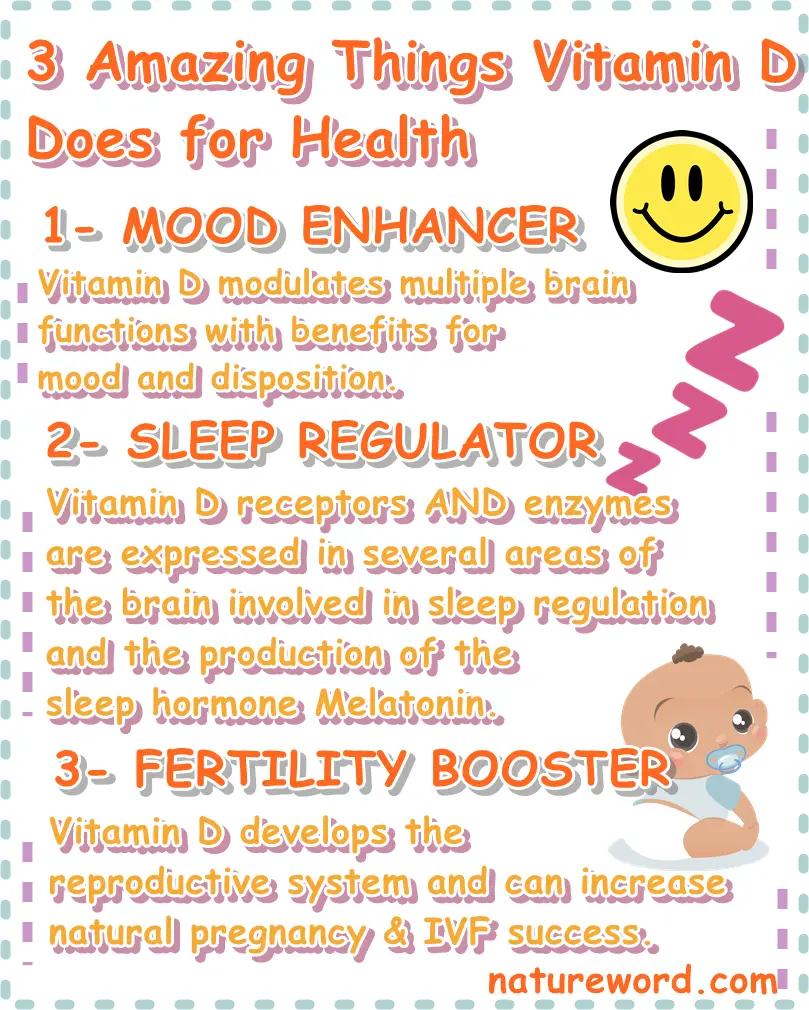When your vitamin D levels are low, your body will start to show signs. Symptoms of a vitamin D deficiency may be subtle, such as almost imperceptible changes in sleep patterns or sudden alterations of disposition such as occasional bouts of low mood.
Or more obvious such as professionally diagnosed affective disorders, low productivity or more frequent and severe respiratory infections and even hormonal imbalances.
Despite being associated predominantly with immune system function status, vitamin D is needed throughout the body and participates in the most surprising of biological processes.
Studies confirm there are receptors for vitamin D close to everywhere in the body, hence the widespread range of action of the vitamin. Read below to discover what are 3 amazing properties of vitamin D you should absolutely know about.

1- Vitamin D is a mood enhancer
Did you know vitamin D has a lot to do with your mood? If you get enough vitamin D every day, you are more likely to have a good disposition, whereas low levels can cause your mood to drop and you to feel uneased or irritated, sulk, stress and experience more anxiety than normal for you.
According to research, ‘receptors for vitamin D (…) have been localized in many tissues, including brain’ tissue (source).
Vitamin D ‘is well-recognized as a neurosteroid that modulates multiple brain functions’ and its activity is well-linked to ‘functional neurochemical and behavioural outcomes’ (source).
In the adult brain, vitamin D helps ‘the connectivity of neural circuits responsible for locomotor, emotional and reward-dependent behavior’ (source), and its presence in the body in sufficient amounts has a positive impact on mood and disposition, and contributes to emotional and behavioral balance.
Note: Most foods except for fish and seafood, and some mushrooms, have very little or no vitamin D.
This means sunlight exposure and vitamin D dietary supplements are vital for you to meet your daily requirements and get the benefits associated with normal vitamin D status.
See my Vitamin D Foods List: Fish High in Vitamin D.
Also see my Vitamin D Foods List: 10 Mushrooms That Have Vitamin D.

2- Vitamin D is a sleep regulator
There are many things causing insomnia and other forms of disturbed sleep, from high anxiety levels, depression, chronic stress and other mental health problems to acid reflux disease, autoimmune disorders and other forms of physical illness. But an insufficient vitamin D intake leading to low levels is also a major cause.
According to research, ‘vitamin D has both a direct and an indirect role in the regulation of sleep’ and low levels of vitamin D have been associated with sleep disorders.
Both vitamin D receptors AND ‘the enzymes that control their activation and degradation are expressed in several areas of the brain involved in sleep regulation’.
‘Vitamin D is also involved in the pathways of production of Melatonin, the hormone involved in the regulation of human circadian rhythms and sleep.
Furthermore, vitamin D can affect sleep indirectly through non-specific pain disorders, correlated with alterations in sleep quality, such as restless legs syndrome and obstructive sleep apnea syndrome’ (source).
If you are low on vitamin D, taking vitamin D supplements can produce a measurable difference in your sleep patterns and sleep quality.
Taking vitamin D can help you sleep better, sleep longer as well as sleep undisturbed, without waking up often during the night.
Of course, other direct causes for your sleep problems will also need to be addressed too, such as eating cleaner (and blander) food if you have GERD that causes acid reflux episodes at night, but overall, taking vitamin D can bring about significant benefits to your sleep.
3- Vitamin D is a fertility booster
The modern woman is experiencing increasingly high rates of subfertility preventing getting pregnant and good pregnancy outcomes, and IVF therapies have become as much a necessity as dental and vision coverage.
One of the big causes of subfertility in women, and also infertility, is vitamin D deficiency.
Optimal vitamin D levels are vital for good fertility. There is actually extensive research on the benefits of vitamin D for fertility, with studies showing a marked increase in fertility and pregnancy success among women and men with adequate vitamin D levels.
Vitamin D is actually a hormone-type vitamin and the discovery of receptors for it throughout the body has made it clear that its role in health is extensive. There are vitamin D receptors in organs and tissues such as the uterus, ovaries, and ovarian tissue, placenta and in the endometrium, the mucous tissue lining the uterine wall (source).
Studies have shown that female (and male) reproductive system tissues and organs express not just vitamin D receptors, but also the enzymes needed for the metabolism of vitamin D. Vitamin D is intently absorbed and processed into an active form at the level of the reproductive system, modulating human reproductive capacity and activity.
Low vitamin D levels can lead to the underdevelopment of the reproductive system in both men and women (e.g. underdeveloped uterus, thin endometrium in women), reduce reproductive capacity (e.g. low count and poor motility in men) and cause dysregulations that impair fertility (e.g. impaired folliculogenesis, lack of ovulation, low implantation rates).
It has already been observed in animal studies that vitamin D deficiency reduces fertility, both male and female (study 1, study 2, study 3) by affecting the reproductive system function. Animal studies have shown that fertility was reduced by a staggering 73% in litters from vitamin D-deficient male rats, for example. Reduced fertility was observed in vitamin D-deficient female rats as well.
Conversely, good vitamin D levels have been observed to increase conception rates and pregnancy outcomes. Women with the highest blood levels of vitamin D have been observed to have ‘the highest chances of pregnancy’ (source). It has also been proposed that adequate vitamin D levels can improve pregnancy outcomes such as the number of live births.
In one of the first studies on vitamin D and fertility after IVF, it was reported that pregnancy rates were almost four fold higher in women who were vitamin D sufficient compared to those who were vitamin D deficient (source).
Discover more wonderful benefits of vitamin D for fertility in both men and women.
